






























SCOTLAND’S NUMBER ONE STUDENT MAGAZINE AUTUMN / WINTER 2022sourcemagazine.org.uk CARING FOR YOUR MIND It’s time to look after your mental wellbeing THE PERFECT CHOICE What to consider when selecting your subjects Choosing your path after school GET FUTURE READY



































































IDEAS | PEOPLE | TRUST
SourceMagazine
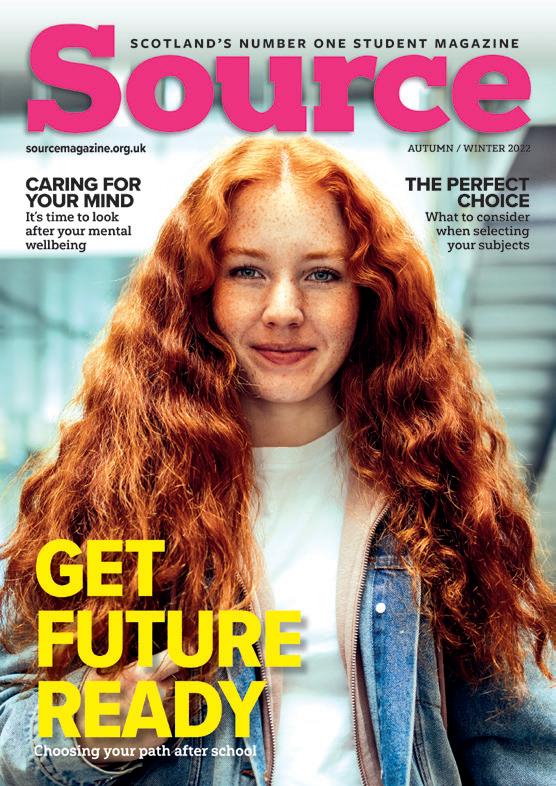
@SourceMag
@source.magazine
PUBLISHER
Denise Connelly
denise@dcpublishing.co.uk
EDITOR
Emma Storr emma.storr@dcpublishing.co.uk

EDITORIAL CONTRIBUTORS

Hanna Clark
Edward Fernandez
Nicole Lough
DESIGN AND PRODUCTION
Lucy Baillie lucy.baillie@dcpublishing.co.uk
SALES
Marian Mathieson marian.mathieson@dcpublishing.co.uk
www.sourcemagazine.org.uk

DC Publishing Ltd, 198 Bath Street, Glasgow, G2 4HG Tel: 0844 249 9007

©DC Publishing Ltd 2022. All rights reserved. No part of this publication may be reproduced or used in any way without prior written permission from the publisher. The views expressed in this magazine are not necessarily those of DC Publishing Ltd. The publisher takes no responsibility for claims made by advertisers within the publication. Every e ort has been made to ensure that information is accurate; while dates and prices are correct at time of going to print, DC Publishing Ltd takes no responsibility for omissions and errors.
The colder weather has started to arrive and whether autumn is your favourite season or you dread the arrival of winter’s dark nights, there’s lots to look forward to. Around this time, you’ll need to start thinking about your next steps: you could be choosing your subjects for next year, figuring out whether higher education is right for you or if a gap year travelling the world is the best option. Inside this issue of Source, we’re here to offer a helping hand, whatever you decide to do next.
If you’re in your last year of school, the last few years might have left you feeling lost or left behind. This is completely normal and you’re not alone.
On page 6, we’re helping you get back on track with tips on building your confidence, seeking out positive experiences and gaining the skills you need to progress.
Starting on page 11, it’s all about getting you ready for upcoming assessments and higher education, starting with the importance of prelims. On page 14 we’re breaking down the UCAS application process, and on page 16 you can consider whether college is right for you.

Higher education isn’t the natural next step for everyone: if you’re wondering whether work, an apprenticeship or a well-deserved break is for you, we can help you decide. Consider the different types of apprenticeships on page 20, before learning about how to start your job or gap year search on page 23.
Plus, we’re revealing our favourite people to follow right now on page 29 and sharing our top picks of autumn/winter reads on page 30. All of this and more awaits you inside.

Emma
#trending
2

FESTIVE PLANNING
Yes, we’re already mentioning the C-word. Christmas will be here before you know it. It’s time to start planning how you’ll celebrate the festive season with friends and family, bonus if you get to pick out a new festive jumper, too.

1
BODY DOUBLING
Struggling to sit down and study? Body doubling could help. The productivity strategy simply involves doing a task in the presence of another person, even if they’re just on a video call to you. You both work on tasks, but independently, in each other’s company.
Editor
This issue of Source is helping you in your next steps after school
www.sourcemagazine.org.uk 3 // welcome
SCOTLAND’S NUMBER ONE STUDENT MAGAZINE
SUBSCRIBE TO SOURCE
STUDY
11 MAKING THE MOST OF PRELIMS exams before the real thing.
12 CHOOSING YOUR NEXT STEPS
As we approach the end of the year, it’s time to pick your subjects.
14 MASTERING THE UCAS PROCESS
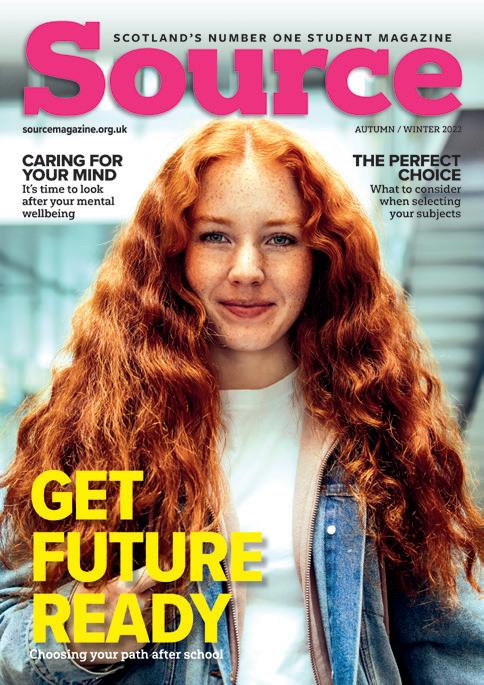


We break down what to expect when you apply to higher education.

16 YOUR COLLEGE APPLICATION
Decide if college is the right choice for you.
18 TIME TO STAND OUT
We’re helping you shine on your applications.
LIFE
6 CLASS OF 2023
After a tumultuous couple of years, it’s time to get back on track.
8 USEFUL DATES
Get organised with this useful list for your diary.
WORK 20 APPRENTICESHIPS: EVERYTHING YOU NEED TO KNOW

How could you earn while you learn?
23 LIFE AFTER SCHOOL
Consider your options for the future if you aren’t heading in to higher education.

PLAY
29 LIFE ONLINE
Distract yourself from stress by following one of our fave bloggers.
30 GET READING THIS AUTUMN/WINTER
Take a study break with one of our top picks.
HEALTH
26 LOOKING AFTER NUMBER ONE
Discover tools to support mental health and wellbeing.
www.sourcemagazine.org.uk4 contents
sign up online at sourcemagazine.org.uk/subscribe IT’S FREE! 6
20 12












Ta king you fur the r
CLASS OF 2023
For young people leaving school next summer, the last few years have meant major disruption not only to school and exams, but to formative years in your social life. It’s time to get on track for your future

Building your confidence, refreshing your soft skills, trying new things and getting organised can help you feel ready for your next steps, regardless of what you plan to do when you finish school. Developing these essential skills might feel impossible, but if you take it one step at a time, you’ll feel ready for the future before you know it.
CONFIDENCE
Confidence is key to having the courage to try new things, but it can

be hard to build. It comes over time and it’s normal to not feel sure of yourself at any given stage of your life. When you’re putting in effort to gain new experiences and build skills, it will come naturally. Whenever you have a moment of doubt, remember that you’re putting in the work and that the people around you probably feel the same, whether they show it or not.
Speaking to your friends about how they’re feeling, or older people who you trust about how they built up confidence, can help you to feel

more at ease and show you that most young people are currently in the same boat. You might reassure them as well as yourself by opening up.
Trying new extracurriculars or activities, getting more involved in discussions during class, taking the lead on group projects, or joining local community groups, can all help to build self-esteem and confidence. You could even meet new people and make friends in the process.
If you are feeling low and like you’re lacking confidence, it can have an effect on all areas of your life and impact your mental wellbeing. If you recognise these feelings in yourself or those around you, there’s different tools you can use to better understand your emotions. Apps like Daylio (daylio.net) allow you to keep a selfcare journal to identify different things that could be affecting your mood, along with setting goals. Similarly, MoodKit (www.thriveport.com) helps users track their emotions and gives them tools to cope based on cognitive behavioural therapy to help manage depression, anxiety and stress.





EXPERIENCE
You might have thought about work experience or a part-time job to gain skills for a higher education application or when you enter the world of work, but these opportunities can also give you vital soft skills.

www.sourcemagazine.org.uk6
Trying new things and seeking out opportunities could open doors in your future and help you discover what you want to do next.
The chance to work part-time at the weekends or attend local groups will give you soft skills like time management; communication; problem-solving and team work. Along with leadership skills and showing a good work ethic, having these skills and the evidence to back them up can make you a more appealing, well-rounded candidate when it comes to future interviews for college, university or your first proper job.
Developing or building on these base skills can seem difficult, but pushing yourself will come with a host of benefits. These are the skills that employers and admissions staff are looking out for when they speak with you. Making use of the people in your support network can help you build on these skills, reach out to
your guidance teacher, favourite class teacher or a member of your family for help.


SOCIAL
Now that you’ve been back at school in-person for almost a year, you might feel like you’ve settled back into your group of friends or even found some new ones, but if you haven’t, don’t fret. Everything could change when you leave high school, especially if you move to a new place to start higher education or your career. Regardless of what things are like now, you’ll be presented with plenty of chances to meet new people and expand your social circle.


In the meantime, don’t let things like imposter syndrome get in the way of studying and achieving what you need to take on your next steps. Imposter syndrome is when you feel a lot of self-doubt and don’t believe you’re qualified to be given the opportunities that you have.
It’s normal to feel like this, but without tackling these emotions, it could hold you back and affect your overall mental health.

When you have these thoughts, try to remember all of the hard work you’ve put in to get where you are. If these thoughts start to get in the way of your school work or part-time job, it can help to keep a list of why you deserve to be where you are: you can refer back to this in moments of doubt. Your friends could be feeling the same way and there’s no shame in opening up about experiencing imposter syndrome, talking to someone close to you could even help you work past it.
FIND OUT MORE
You can speak to different organisations like Student Minds (www.studentminds.org.uk) or SeeMe ww(www.seemescotland.org.uk) if you’re feeling worried about the future.


The chance to work part-time at the weekends or attend local groups will give you soft skills
www.sourcemagazine.org.uk 7
// LIFE
dates for your diary
Keep on top of your deadlines with these helpful dates

BONFIRE NIGHT
Enjoy the fireworks with friends and family.
NATIONAL STRESS AWARENESS DAY
Take time to learn coping strategies and where to find mental health support.
TALK MONEY WEEK
Worried about looking after your money at uni? This is your chance to get in control.
ANTI-BULLYING WEEK
This year’s theme is Reach Out, see how to take part on page 26.

ROAD SAFETY WEEK
Learn more about how to stay safe as a pedestrian and a driver.
IN-SERVICE DAY
Relax at home while your teachers prep for the weeks ahead.
ST ANDREW’S DAY
Mark this national holiday by learning about Scottish traditions.
CHRISTMAS
School's out for Christmas, it’s time for some well-deserved rest.
25 SCHOOLS CLOSE FOR
CHRISTMAS DAY
How are you marking the best day of the festive season?
BACK TO SCHOOL
It’s time to get studying.
UCAS DEADLINE
If you’re applying for an Undergraduate or Conservatoire course you have to submit your application by today.
MID-TERM BREAK
What will you do with your long weekend?
8 www.sourcemagazine.org.uk
5 6 9 11 18 30 16-21 NOVEMBER
22 4-6 13-14 25 DECEMBER JANUARY FEBRUARY 13-14 Always double check term dates for the council you live in
BY
BY
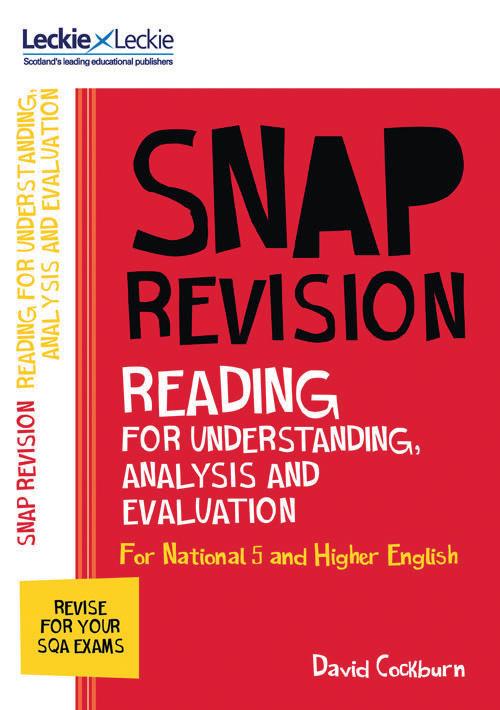


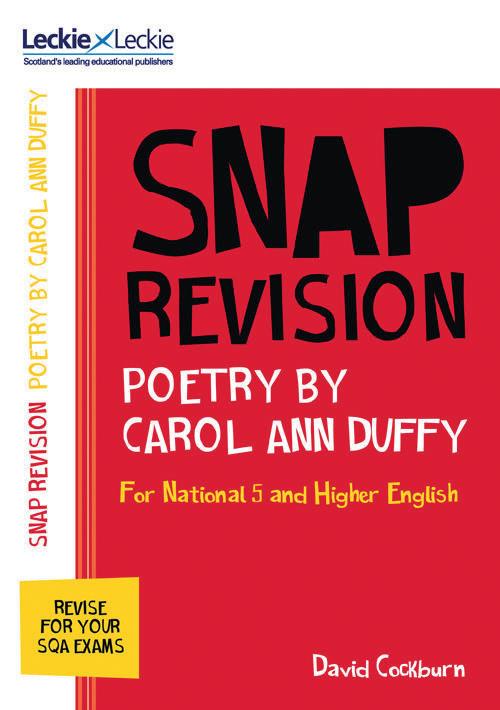


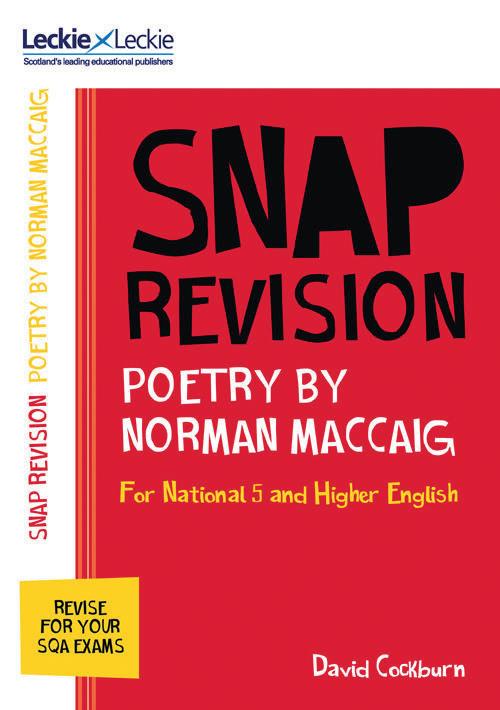

Revise N5 andHigher Englishin a snap!REVISION Handy A5 format! practice questions and tips written especially for N5 and Higher exams has ALL the key information you need to get great results in your exams POETRY
CAROL ANN DUFFY AND POETRY
NORMAN MACCAIG Available at all good bookshops or search online READING FOR UNDERSTANDING, ANALYSIS AND EVALUATION Explains sentencestructure, word choiceand language techniques Understand themes, structure and poetic techniques

making the most of prelims
Have you come back to school a er a summer of freedom to find prelims on the horizon?
Don’t stress, with our handy guide you’ll be prepared to ace your mock exams and get the most out of the experience, even if you’ve never sat them in-person before
Prelims, which your school might call mock exams, are just that: practice exams to give you a taste of the real thing. Being told prelims are looming around the corner can put a dampener on the start of your term. It’s perfectly normal to worry about these, especially if you’re yet to sit in-person exams after the pandemic. However, prelims can, with the right commitment to studying, be hugely beneficial.
why do prelims exist?
Prelims exist so you and your teachers can see how you might perform in your summer exams. They give you a chance to master your revision technique, get to grips with your subject and become accustomed to the exam process.
taking advantage
Prelims let you discover what works for you: where do you revise best? What type of notes work for you? Do you have a favourite exam pen?
All these factors, big or small, make a difference on the day, so it’s worth using prelims as an opportunity to fine tune your study methods. Prelims are also useful as a chance to assess your weaknesses. Are there certain topics that make your stomach drop when you see them in a paper? Prelims let you identify
those areas so you know them inside out by the time the summer exam diet rolls around.
simulating the environment
One of the main benefits of prelims is that they recreate exam conditions. You’ll get an accurate experience of everything from finding your chair to learning how to manage your time in an exam. With a prelim in the bag, those things will come naturally during the real thing, freeing you up to focus on keeping all that important knowledge at the forefront of your mind.
This is especially important for those who have missed out on an authentic exam experience because of the pandemic. Whilst online exams are challenging in their own right, a practice in an exam hall is an invaluable experience for a postpandemic exam season.
getting results
You can’t accurately recreate exams without the most important ingredient: getting your results. Like exams, waiting for prelim results can be anxiety-inducing. Try to stay calm, the exam is over and no amount of panicking will change your grade.
If you’re greeted with results that leave you feeling disappointed, don’t panic and definitely don’t beat yourself up: these are just prelims. You’re supposed to learn from them so you can avoid that feeling of frustration on your real results day. This is your chance to speak to your teachers and improve before your actual exams.
FIND OUT MORE
The SQA (www.sqa.org.uk), the people in charge of setting your exams and awarding your grades, have study tips and up to five years’ worth of past papers to help get you in revision mode.
// STUDY www.sourcemagazine.org.uk 11
CHOOSING YOUR NEXT STEPS
As we approach the end of the year, it’s time to pick the higher or advanced higher subjects that you’ll start after summer 2023. This can be a head-spinning task, but if you consider your passions, strengths and what your future career requires, you should be able to find the perfect balance

what are highers and advanced highers?
Highers are the second highest level of Scotland’s National Qualification (NQ) system, and advanced highers are the highest. They cover subjects ranging from Philosophy to Computer Science to Dance. Whatever you’re interested in or skilled at, there should be a higher to suit your needs.
In fifth year, you will sit four to five highers. You may perform well enough in these to begin applying for university early, or you can do additional highers in sixth year, or even take those subjects at advanced higher level.
GOING INTO SIXTH YEAR
The format of advanced highers is the closest thing to degree-level studying so they can help you prepare for higher education if you plan to do this after school. They are also a chance to pursue subjects that are exciting or useful to you, normally in a smaller class size. Most university courses just require highers, so advanced highers are less for your entry requirements and more for your own academic development.
For competitive courses, like
medicine or dentistry, a mix of advanced highers and highers may be necessary. Check with the universities you’re interested in to find out their requirements before making your choices.
Sixth year students can also study Scottish Baccalaureates. These might sound fancy, but they’re just higher or advanced higher subjects in combination with an interdisciplinary project, and are valued by universities.
MAKING THE RIGHT CHOICES
When it comes to making your subject choices, the first step is to ask yourself what you enjoy. Your future career is important, but if there’s no initial passion for the subject then you may be signing up for a miserable grind. With a subject you find compelling, studying can become a challenging but satisfying process that teaches you about yourself as well as the topic.
Next, ask yourself what you’re good at. This is normally what you enjoy, but you may have to sacrifice something you like and find more
challenging, for something you excel at but find slightly dull. If you’re unsure, ask teachers, parents and friends where they think your strengths are.
Finally, ask yourself what you need. If you want to study nursing, biology might not get you as excited as the prospect of caring for others, but it’s often essential to study healthcare in higher education. If you’re not sure what career you want, take time to research jobs and degrees you’re interested in and the highers they require, you could even arrange a meeting with your guidance counsellor or your school’s careers advisor before you submit your final choices.
FIND OUT MORE
The SQA (www.sqa.org.uk) oversee all Scottish qualifications. The SQA website is full of useful information on subjects, universities and apprenticeships. Your school might also have a careers adviser who can help you make sure you pick the right subjects.
www.sourcemagazine.org.uk12
// studY




















www.dundeeandangus.ac.uk #choosecollege www.qmu.ac.uk
mastering the
ucas process
Thinking of heading in to higher education next summer? We’re here to help you ace your application and take your next steps towards college or university
If this is your last year of school and you’re hoping to head to higher education in summer 2023, it’s time to start thinking about your UCAS application. This is essentially the ticket to your next steps and encompasses your whole application. This is made up of three main parts: the personal statement; your reference; the application itself.
We’re helping you break them down into easy-to-digest chunks and spotlighting the best places to find advice and support. Remember: it’s never too early to start thinking about your application and especially your personal statement, the more time you have to go over these, the less stressed you’ll feel on deadline day.


APPLICATION
Your UCAS application is completely digital and the best part is you don’t have to complete it all at once. Using your log in, you can keep going back in and fill out different sections when you’re ready to. This is a great way to make the process feel less overwhelming and gives you the time to ask your teachers any questions you have along the way.
Your school and guidance counsellor will help you access your UCAS account and will be your point of contact for any queries or worries you have about any part of your application. Once you’re logged in you will be able to fill out the essential information that makes up your application. This includes:

























































Remember, it’s never too early to start thinking about your application and especially your personal statement
www.sourcemagazine.org.uk14
your contact details; questions about your background and personal circumstances; if you’re applying with the support of your school. You’ll also have to input your education history, what qualifications you’re currently studying and if you’ve had any paid jobs even if they were part-time.
The next step is picking your top five courses. You can add them all at once or choose some later and there’s no preference order, plus the universities and colleges you’ve applied to won’t see where else you have added. There’s a host of factors to consider when making your choices: the course itself and whether its right for you; the location of the university; whether you will have to move away from home or not. Speaking to a parent or guardian, your guidance counsellor or your favourite teacher can help you decide. It’s also a good idea to visit the institution and the city it’s based in before you add it to your list, and if possible, speak with existing students about their experience.
PERSONAL STATEMENT

This is the part of your application that helps you stand out and show your personality, achievements and interests. Your personal statement has to be at least 1,000 characters long, but it can’t be more than 4,000 characters or 47 lines –whichever comes first. That might seem like a lot right now, but when you start writing, it will probably be difficult to keep to this limit. Don’t focus too much on the character limit on your first draft: it will be easier to cut it down once you know what you want to include.






Starting your first draft might seem scary, but you can break it down into sections and write one at a time. It’s basically an essay about you, highlighting how your interests, experiences and qualifications relate to what you want to study in higher education. It’s a great way to shine a light on your skills and knowledge, and show off all your hard work up to this point. Like any essay, it should have a clear introduction, middle and conclusion.
Using the ABC method will help you structure your personal statement, this stands for action, benefit, course. It helps you explain what you’ve done (like volunteering in your local area), what it taught you (like transferable skills), and how this will help you in your studies or future career. Always proof read your personal statement before you press submit, and have someone like a teacher look over it to get feedback. They can also help if you get stuck on what you should and shouldn’t include.
REFERENCE
The last step of your UCAS application is your reference: this is completed by a teacher or another member of school staff and essentially backs up everything in your personal statement. Think of it like an endorsement of your achievements so far. This also gives your teacher the chance to include anything that has affected your studies and grades, like being a young carer or a recent loss in your family.
Before you know it your UCAS application will be complete, then it’s time to study, complete your final exams and wait to confirm your place on results day.
IMPORTANT DATES

Keep a note of these key dates to ensure you don’t miss an application deadline.
3 October 2022
Closing date for music applications.
15 October 2022
Applications for Oxford, Cambridge and most courses in medicine, dentistry and veterinary medicine are due.
25 January 2023
The deadline for the majority of undergraduate courses.


23 February 2023
















UCAS Extra opens for eligible applicants.
24 April 2023


The 2023 SQA exams diet begins.
30 June 2023

After this date, any late applications will automatically be entered into Clearing.
5 July 2023
Clearing opens.
8 August 2023
SQA exam results day is here.
FIND OUT MORE Get support and more information from UCAS directly at www.ucas.com
www.sourcemagazine.org.uk 15 // studY
your college application
why college?
In 2021, more than 239,000 students attended college in Scotland, and for good reason. College is a great step between high school and university: the structure of classes and schedule is similar to school, but there’s still more independent study like university. Colleges tend to have smaller class sizes and more one-to-one contact with lecturers and tutors than a university, and if you don’t want to move out yet you might have a local college that offers a wide range of courses. It’s also a great option if you only want to attend higher education for a couple of years.

Colleges throughout Scotland offer two-year foundation degrees, and if you want to go to university after this, you can sometimes enter third year after going to college instead of starting from scratch. Going to college after you leave school is a great option, especially because most Scottish colleges offer qualifications in over 200 subjects, but it can also be a good backup if you don’t get into your chosen university degree. Time spent at college will help you build your knowledge and the skills that employers are looking for before you make the transition to uni.
Applying to a college is a little different than applying to a university: you can still search for advice and information using UCAS - aka the Universities and Colleges Admissions Service –and you can even apply for some HND or HNC courses using the service, but most colleges accept applications directly. This means you often have more choices and can apply for as many courses as you like, but you will also have to complete a separate application for each college you apply to.
It’s easy to browse college courses, simply visit the website of the institution you’re interested in and look for the ‘our courses’ tab. Here you’ll find a list of everything on offer that can usually be filtered down to topic, qualification type and whether you want to study for your degree fulltime or part-time.






applicationOnce you’ve found some courses that you like the sound of, it’s time to start your application. Courses open for application should have an ‘apply’ button online, and if they don’t you can call or email the admissions department for guidance on what to do next. Like any higher education application, you’ll have to fill in your contact details, a bit about your background and what qualifications or work experience you have.
You’ll also have to write a personal statement or essay discussing why you want to apply to the course in question.
It can be helpful to write your application in a word document first, this means you can tweak the same one for different colleges or courses.
FIND OUT MORE Get help with your college application from www.ucas.com and www.myworldofwork.co.uk

Ready to take your next step and apply to a college course? It’s time to see whether college is the right fit for you and prepare your application
It’s easy to browse college courses, simply visit the website of the institution you’re interested in
Different colleges and courses have their own application deadlines
www.sourcemagazine.org.uk16 // studY
Start your journey with UHI Moray
UHI Moray is different from traditional universities and colleges. We offer highly flexible, multi-level access to further and higher education making it easy to join and leave at just about any stage in your academic, professional or personal journey.
You can join us for a short course, a full degree or postgraduate qualification whether you are coming straight from school, or much later in life.
No matter how many semesters or years you spend at UHI Moray, each course you take will offer a clear pathway for progression to the next level, or to the world of work.

Where learning means more Apply now or find out more moray.uhi.ac.uk student.services.moray@uhi.ac.uk 01343 576000 UHI Moray: Where learning means more
time to stand out
Are you applying for college, university or a job? It can be overwhelming trying to write an application that stands out, especially if it’s your first time doing it. We’re helping you super-charge your application

EXPERIENCE
The best way to prove you’re a strong candidate for your chosen course or job is by getting work experience with a relevant employer. You’ll be able to write about the tasks you completed, challenges you faced and lessons you learned whilst on placement. This will demonstrate a first-hand knowledge of the field you’re interested in.
Getting work experience requires research and persistence. You need to find employers you’re interested in, and then make sure you’ve done your research before you approach them. A politely worded email with a copy of your CV is the best way to get in touch with them once you’ve narrowed down your search.
Getting work experience requires research and persistence
PART-TIME JOBS
Part-time jobs look fantastic on applications. Like any job, these come with their own challenges and lessons, and the fact you’ve committed to a steady job and started taking charge of your own finances shows you have discipline and independence.
Jobs where you interact with the public, like hospitality or retail, are also highly valued because they give you great communication skills. These soft skills make you a strong match for a wide array of future jobs where public interaction is essential.
HOBBIES
Hobbies show employers or admissions tutors you’re an interesting person, but you’ll have to translate them into why you’re a good candidate. Maybe you’re into rock climbing: this shows anyone reading your application that you’re an adventurous person who is able to take on demanding challenges.
If you’re struggling to find a hobby, research what’s on offer in your local
area and at your school. If you don’t find something you enjoy, just keep trying new things. You never know what might excite you.
VOLUNTEERING
Volunteering is a great way to meet new people, discover your passions and make positive changes in your community. It shows you’re someone who gets involved in what’s going on around them and who’s willing to give their time to help others.
Try and find a volunteering role that’s relevant to your chosen course or job. If you want to pursue nursing or medicine, volunteering in a care home can show you have the qualities necessary to work in a healthcare setting.
FIND OUT MORE
For advice on job applications, Skills Development Scotland (www.skillsdevelopmentscotland. co.uk) have a team of advisers ready to help you.
www.sourcemagazine.org.uk18
// studY
Degree Pathways at Fife College
Your Flexible Alternative to University


What are the benefits of choosing the college route to a degree?
Save money by studying closer to home
Gain the same university degree in the same amount of time
Take your studies one year at time
HNC HND Degree Options Over degreespathways450to fromHNC and coursesHND
Achieve a recognised qualification for every year of study
Opportunity to gain direct entry to 2nd /3rd Year of a Degree from an HNC/D
Study some degrees in full at Fife College
Visit fife.ac.uk/HE-apply to find out more Follow us: facebook.com/fifecollege @fifecollege Fife.ac.uk 0344 248 0115 info@fife.ac.uk
APPRENTICESHIPS
EVERYTHING YOU NEED TO KNOW
You could earn money, gain valuable experience and enhance industry-specific skills with an apprenticeship. Read on to find out which apprenticeship can propel you into your dream job
WHAT ARE APPRENTICESHIPS?
Apprenticeships are courses that combine qualifications with industry experience. Modern and graduate apprenticeships even allow you to earn money whilst you study a higher qualification or even degree level qualification. If you’re ready to move from the classroom to the workplace, then an apprenticeship will give you your first foothold on the careers ladder.
FOUNDATION
If you’re still in school but want a taste of the world of work, then a foundation apprenticeship (FA) is perfect for you. You’ll complete your apprenticeship alongside your studies, and whilst they’re unpaid, FAs are an opportunity to discover the careers that excite you.
There are 12 distinct FAs available at SCQF Level 6. These are equivalent to a higher qualification and encompass a broad range of careers. Fancy making a splash in Scotland’s booming gaming industry? An FA in Software Development will teach you the essentials of web design and app development, priming you to work in an industry that needs more skilled workers than ever before.
If you want to work in Scotland’s diverse and innovative creative industries, a FA in Creative and Digital Media will equip you with valuable knowledge and skills to work in film, television or fashion as well as many other career paths.
If you’re not ready for a higher-level apprenticeship, there are three FA subjects available at SCQF level 4 and 5. These are equivalent to National 4 and National 5 qualifications and cover three more general areas: Automotive, Construction and Hospitality. Whatever FA you pursue, you’ll be working side by side with industry professionals and gaining an insight into your future career that a classroom can’t give you.
modern
If you’re 16-years-old or over, you can apply for one of more than 100 modern apprenticeships (MAs) that are available. You’ll study and work full-time, earning money as you complete a course that will give you industry specific skills and make you highly employable.

There are four different levels of MA, with the highest being equivalent to a degree. MAs also cover many career paths: if you’re good with numbers, you could work as a trainee accountant with an Accounting MA. Maybe you’ve got a passion for all things that
run on engines - an Automotive MA could see you working as a motorcycle technician.
Modern Apprenticeships are developed by working with employers and key partners in their sector to produce training programmes. This means your MA will be tailored towards the needs of employers in the sector, making your transition from apprenticeship to full-time work as smooth as possible. As they say, the proof is in the pudding: six months after completing a MA, 92 per cent of apprentices stayed in work.
www.sourcemagazine.org.uk20
GRADUATE
Do you want to continue your academic career whilst making yourself as employable as possible? Graduate apprenticeships (GAs) mean you get paid whilst also studying for a degree. They give you valuable industry experience as well as the necessary academic theory to excel in your chosen industry. SAAS will also pay for your degree, which can go up to a Master’s level.
A GA in Cyber Security could see you working within an organisation on their digital security whilst studying the laws and ethics relevant to your job at a university. With a GA in Early Learning and Childcare you’ll learn key concepts around children’s development before applying them in a classroom environment. These are just the tip
of the iceberg when it comes to the selection of GAs available to you.
Skills Development Scotland have specifically designed GAs to respond to the demands of the Scottish economy: your degree course will channel you towards growing sectors, including jobs in sustainability and computing.
Employers are clearly keen for graduate apprentices to join their ranks. In 2021, more than 1,000 students embarked on a GA, compared with just 277 when the scheme began in 2017. GAs are open to all ages and all career stages, so if you already have relevant qualifications or experience, you can join your programme at a later year. This means you’ll get to skip the areas that you already know instead of having to go over it twice.
APPLYING FOR AN APPRENTICESHIP
If a FA sounds like a good fit for you, then you should approach your teachers or school careers service. They’ll be able to help you find the FA best suited to your skills and make sure you have any qualifications needed to successfully apply.
For modern and graduate apprenticeships, you apply as you would for any other job. Whilst your school can
help you, you send your applications directly to employers and universities. You may then be asked to attend an interview or complete tests to ensure you’re the right candidate.
You should make sure your research is exhaustive. Find out what the hours, pay and demands of the apprenticeship will be. You don’t want to end up having to finish an apprenticeship you dislike.
FIND OUT MORE Skills Development Scotland (www.apprenticeships.scot) provide information on apprenticeships and a search engine for vacancies near you.

They give you valuable industry experience as well as the necessary academic theory
www.sourcemagazine.org.uk 21
// WORK
Did you know that NHS Scotland is the largest employer in Scotland with over 300 job roles and career opportunities? There are career opportunities to suit everyone.

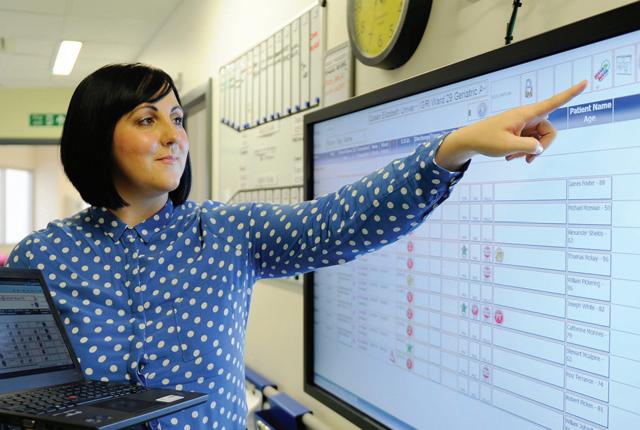
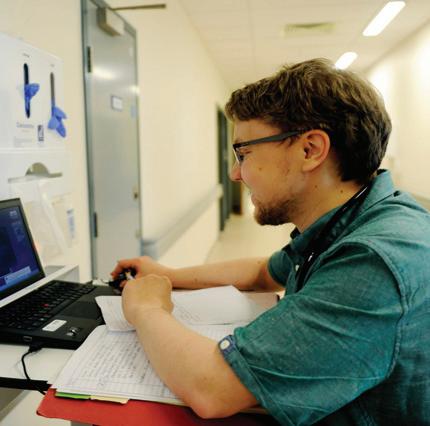
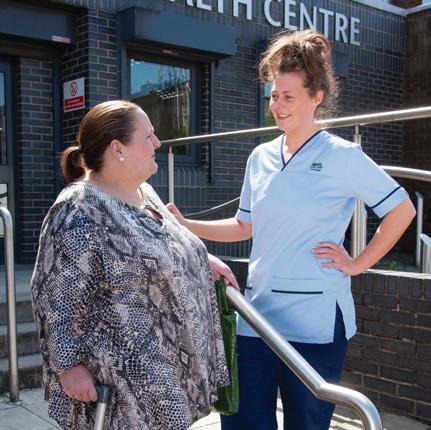
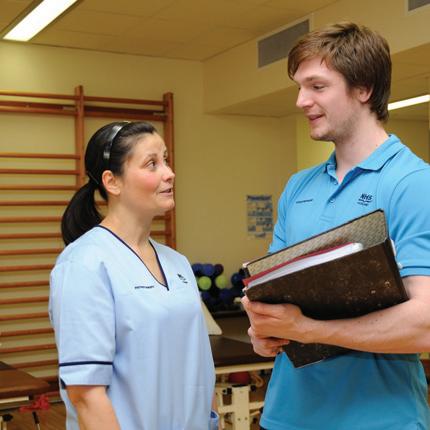
We have a wide range of jobs at entry level and offer great opportunities such as modern apprenticeships across a range of specialities and various levels!

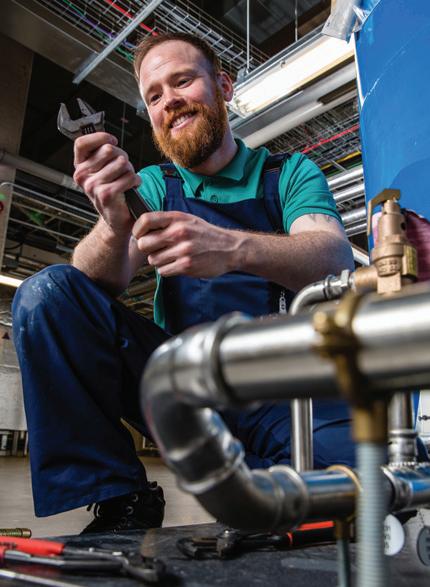
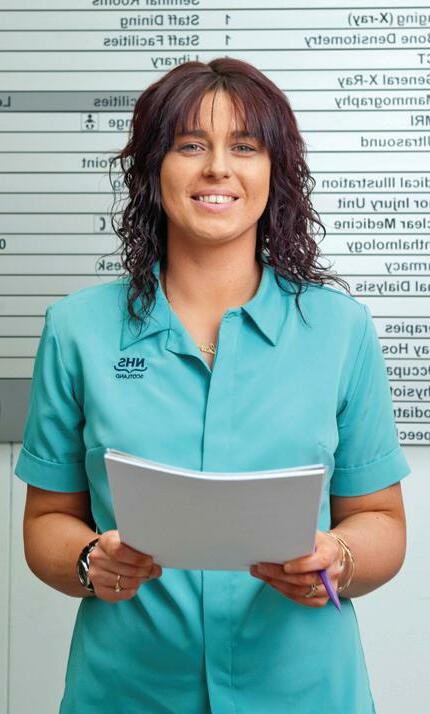
If you have an interest in an exciting role, where you can really make a difference, one of our Modern Apprenticeship opportunities may be for you!
We recruit to a range of MA roles across NHS Lothian during the year and we have plans for 3 cohorts in 2023:
Cohort 1
Advert Live - 6th January 2023
Start Date - 20th March 2023
Cohort 2
Advert Live - 12th May 2023
Start Date - 31st July 2023
Cohort 3
Advert Live - 1st September 2023
Start Date - 20th November 2023
For more information on the types of MA roles we have on offer, look at our website or get in touch with the team and we would be delighted to provide advice and support:
Visit: careers.nhslothian.scot/workforcedevelopment
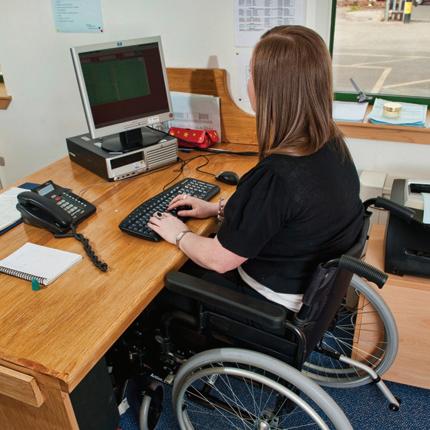
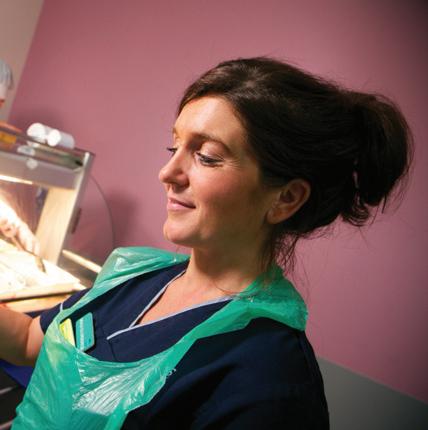
email: careersforall@nhslothian.scot.nhs.uk
Vacancies: https://apply.jobs.scot.nhs.uk
@NHS_Lothian, @yourNHSLfuture
life after school
If you don’t want to continue your path in education after school, there’s plenty of options to help you reach your dream role and to decide what you want out of your future career
Once you have decided that you don’t want to move on to higher education, speak to your teachers and guidance counsellors at school about your next steps. They can help you plan pathways into work so that you aren’t starting this process alone.
After leaving school, there’s plenty of options open to you that don’t include continuing on to higher education. College and university aren’t for everyone, plus, you might not need an extra qualification or degree to start the career you want. You aren’t alone in choosing what you want to do next, there’s support available every step of the way.
work
If you’re ready to start your career and earn a full-time wage, entering the world of work straight from school could be right for you. You might have a particular role or company in mind, but if you don’t then there’s plenty of ways to launch your job search: you could attend a careers fair, visit a job centre to have a chat with a specialist advisor, or start doing your research online.
One of the most effective ways to reach employers is to get registered on job boards like Indeed (www. indeed.com). This means that you can upload your CV and contact information so that if a relevant position comes up, employers
already have access to your details and can message you if they think you’re going to be a good fit. Another great way to network with professionals is through creating a profile on LinkedIn (www.linkedin. com). This is essentially a social network for people in the world of work, letting you find other professionals in the same area or with common interests.
If you don’t know what you want to do yet, or you can’t decide between a few different careers, you could pursue work experience to explore your options. This will also look good on your CV and give you additional skills before doing the real thing.

www.sourcemagazine.org.uk 23
// WORK
GAP YEAR
If you don’t feel ready to start a job, we totally get it and there’s other ways to fill your time that will be valuable for your future. A gap year is a great way to take a break from the stresses of school and work, and can help you figure out who you are and what you want to do. Remember – no career is set in stone and you can always make a change in the future.
There’s a whole list of ways you can spend a gap year but the most popular choices are volunteering and travelling. The people skills and confidence you gain during this time will help you when you do decide what you want to do next and you might even find a new passion while you see new places or dedicate your time to others.

If you’re volunteering in your local area and living at home, a part-time job can give you some extra cash for social occasions and to treat yourself. The first step if finding out who is hiring in your local area. If you live in a city, it can be easiest to check online, whereas if you are in a more rural area, going into different businesses to ask about positions and hand in CVs is an effective way to find vacancies.
A part-time gig could be anything you want, you could go old school and mow your neighbours’ lawns for a tenner, or find a role in an area that you’re passionate about. Whatever you do, you will gain great transferable skills that then go on to benefit you in your future.
GRADUATE SCHEMES
Graduate schemes are work-based training with a difference. Made specifically for university graduates, they are a great way to gain practical experience in your field whilst getting paid. They basically give you a head start in your career but require a lot of hard work. These opportunities normally last between one and three years, but this can depend on the company you apply to and the industry they work in.
Regardless of whether you pursue the same industry after your graduate scheme is finished, or you want to make a change, it will give your CV a boost in the future and help you to stand out from other candidates.
 FIND OUT MORE
Start thinking about what you want to do when you leave school with My World of Work (www.myworldofwork.co.uk/pupils).
FIND OUT MORE
Start thinking about what you want to do when you leave school with My World of Work (www.myworldofwork.co.uk/pupils).
// WORK
www.sourcemagazine.org.uk24





























www.qmu.ac.uk Join us at our on campus Undergraduate Open Day to find out more about studying at QMU. EDINBURGH Queen Margaret University Join us to change your world To find out more or visit our campus: gcu.ac.uk/study/undergraduate
LOOKING AFTER NUMBER ONE

The last few years have come with a lot of new challenges, and there’s no doubt that there will be more to come, but it’s nothing you can’t handle when armed with the right tools to support your mental health
ONE STEP AT A TIME
As you settle into the new school year, it’s time to start thinking about UCAS applications, prelims and your next steps. All of this can feel very overwhelming, so it’s important to take the time to look after your mental health and wellbeing.




When thinking about your next stepsespecially writing about yourself in the dreaded personal statement - imposter syndrome can creep into your thoughts. This is when you feel like you aren’t good enough and are finding it difficult to identify your strengths. You’re probably your biggest critic, but being overly







focused on what you believe are your flaws will prevent you from recognising all of your great achievements. Explaining how you’re feeling to a friend, family member or teacher can give you insight on your strengths and best traits.
One of the best ways to tackle upcoming stressful situations is to focus on your next step instead of the destination. Stressed out about looming prelims? Try not to focus on having to revise everything that you’ve covered so far and instead break it down into sections, allowing you to do a little each day. Take it one step at a time: you’ve got this.
www.sourcemagazine.org.uk26
MINDFULNESS
If you feel like your thoughts and worries are taking over, try selfhelp practices like mindfulness to get in control of your mental health. Mindfulness in itself seems pretty straight forward: it’s being aware of what we are doing in the present without overanalysing everything around us, but our minds are so powerful that our thoughts can cloud reality.
With so much going on, this might leave you feeling like you’re spiralling and create feelings of anxiety about the future instead of allowing you to live in the moment. When this happens, mindfulness
techniques like meditation are great for bringing you back to the present.
Everyone has access to mindfulness because it can be as simple as sitting down to take some deep breaths, but there are lots of techniques that can help you get started. Meditating, inserting short pauses into everyday life and activities like yoga or sports can help. Blue Sky Behavioural Health (www.blueskyrecovery.com) have resources to help you discover more self-help strategies that you can try such as the power of visualisation.

ANTI-BULLYING WEEK
GETTING HELP
If you’re struggling with your mental health, speak to someone you trust about how you’re feeling. They might be able to help you more than you think.
If you’re too anxious to open up to people you know then you can use online tools like TogetherAll (www.togetherall.co.uk) to connect with other people experiencing similar feelings in a safe space that is moderated by professionals 24/7.
Another way to explore your feelings without having to have a full conversation with someone is through Feels FM (www.feelsfm. co.uk). This is an emoji powered jukebox for mental health. All you have to do is select the emoji that
best fits how you’re feeling and the app will generate a playlist for you. While your playlist is generating, you will be asked optional questions about your mental health and given information on how people can help. Feels FM also has a symbol in the corner that provides numbers for different organisations that can offer support, so you can contact a dedicated helpline if you need to.
Need ways to cope with stressful school situations? AyeFeel (www.young.scot) contains lots of information about dealing with exam stress and time management while providing techniques for you to gain some control over your anxiety.
Social interactions have a big effect on how you feel about yourself, with roughly one person in every classroom being bullied daily we all need to do more to stop bullying behaviours and make schools a safer place.
You can help raise awareness this Anti-Bullying Week, taking place from 14 to 18 November, to help combat bullying behaviours. This year’s theme is reach out, which focuses on making sure that everyone asks for help whether they are concerned for themselves or other people around them.
An easy way to get involved and show your support is by participating in Odd Socks Day. All you need to do is wear odd socks, so why not dig out your funkiest pair? Odd Socks Day celebrates uniqueness and individuality while having some fun.
You can get involved on the week using #AntiBullyingWeek and #ReachOut on Instagram, TikTok, Facebook and Twitter or follow this movement on Twitter via @ABAonline. You can use this opportunity to fill everyone’s feeds with positivity and make sure people feel like they can reach out when they need help, in turn tackling isolation.
REACHING OUT
If you are experiencing bullying behaviour, it’s important to tell someone you trust as soon as possible. Try to keep a record of what’s happening in a journal and if it’s happening online make sure that you screenshot it. This can
make it easier when it comes to telling someone as you can give them your record without having to explain everything. Remember that if you are experiencing bullying behaviours, never blame yourself, it’s not your fault.
FIND OUT MORE For more information about Anti-bullying Week and where to seek help visit www.anti-bullyingalliance.org.uk
Social interactions have a big effect on how you feel about yourself
// HEALTH
www.sourcemagazine.org.uk 27





















Tune out of studying and into pop culture with our top pick of people to follow on Instagram this season

COMEDY

Paul Black
@paulblack_

You might recognise Paul from one of his viral TikToks, but the writer and comedian is sharing his best bits and daily life on the ‘gram. Keep up to date with his latest sketches and when his next live show is taking place, or just enjoy getting to know our fave homegrown comedian behind the scenes.

FOOD Edinburgh Eats
@edineats
Planning to head to college or university in Edinburgh next year or just ready for a day trip to the capital? Don’t forget to plan some of Edinburgh Eats’ top picks into your itinerary. Ailsa is eating her way around the city, sharing her best finds with a following of more than 25.5k. Just one look at her grid will have you drooling and wondering where to go next.


TRAVEL
Sarah Afiqah
@theworldwithsarah
If you love travel and photography, Sarah’s feed is the perfect place to escape to when you need a break. The Scottish and Singaporean photographer regularly shares her adventures with more than 75.3k people online. Her grid will leave you feeling inspired to discover more of our bonnie wee country, but she has also ventured further afield to destinations like Madeira, Iceland and Jordan.
FASHION
Amy Bell
@amybell

You might know Amy as the Little Magpie, but her updated handle doesn’t mean her content has changed: this honorary Scot is still giving us outfit inspo every day. Whether you’re looking for some inspiration ahead of a shopping spree, or you’re just trying to plan the perfect outfit for a day out, a holiday, or an occasion, Amy has you covered.
 Rodgers
FIND OUT MORE Discover more content creators on 23 October when the winners of the first Sco ish Influencer Awards (www.sco ishinfluencerawards.com) are announced.
Rodgers
FIND OUT MORE Discover more content creators on 23 October when the winners of the first Sco ish Influencer Awards (www.sco ishinfluencerawards.com) are announced.
www.sourcemagazine.org.uk 29
// PLAY
PICS: ©VIA INSTAGRAM
GET READING
THIS AUTUMN / WINTER
Take a study break and start one of our top picks of this season’s books
Scattered Showers
Rainbow Rowell



Age: 14+
Release Date: 8 November 2022 www.panmacmillan.com
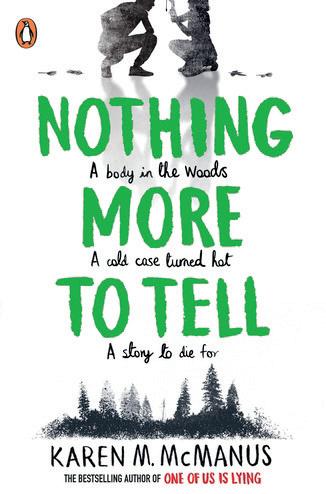
Rainbow Rowell presents nine love stories in her new collection of short stories, Scattered Showers. She captures the voice of young people in a raw and profound way while still managing to stay funny and engaging. This young adult fiction showcases powerful narratives as well as voicing important LGBTQ+ storylines.
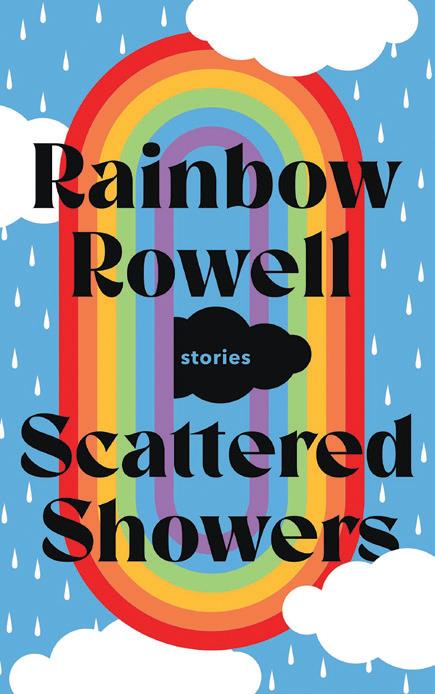
Nothing More To Tell
Karen M McManus
Age: 14+ Release Date: 30 August 2022 www.penguin.co.uk
Written by author of Netflix Original, One of Us is Lying, Nothing More to Tell is a crime-thriller fiction that tells the story of a high school murder mystery. After achieving his dream internship on a true crime tv show, protagonist Brynn returns to his old school to find out what really happened all those years ago.
I’m Glad My Mom Died
Jennette McCurdry Age: 17+

Release date: 9 August 2022 www.simonandschuster.com
Nickelodeon star Jennette McCurdy has turned heads with her autobiography, I’m Glad My Mom Died. Written with unbreakable honesty and dark humour, Jennette speaks on her traumatic child star fame at the hands of her mother. This is an inspiring and candid coming of age story, as she discusses her experience with sensitive but important topics like abuse, addiction, mental health and recovery.
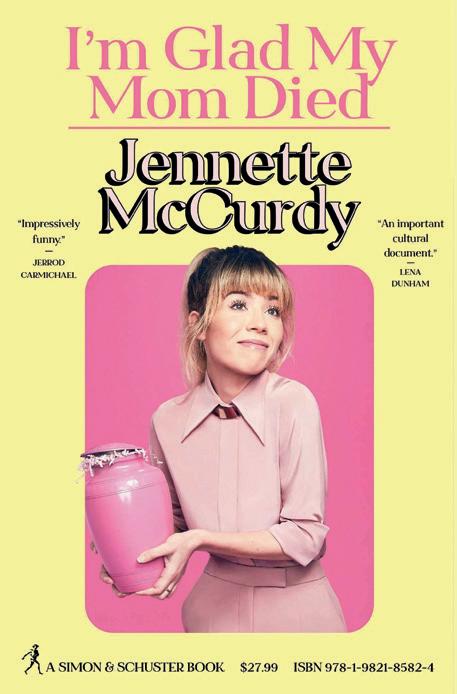
A Better Day: Your Positive Mental Health Handbook
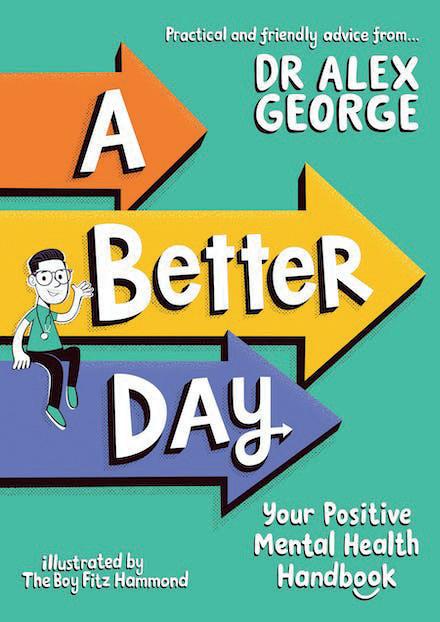
Dr. Alex George
Age: 10+ Release date: 15 September 2022 www.hachette.co.uk
Doctor, youth ambassador and reality tv star Dr Alex George aims to break mental health stigma by helping you think about your mental health in a positive way. Covering topics from peer pressure to online trolls, anxiety and stress this book provides the practical techniques on how to switch your mindset with confidence.
There are many ways to access books like these for free. As well as a ending your local library, the Open Library (www.openlibrary.org) offers a huge collection of classic and current books online. Much like the Open Library, the Libby app (www.overdrive.com) for your phone or laptop gives you access to a huge database of audiobooks.
Share your favourite reads with us on social media by tagging
// PLAY
www.sourcemagazine.org.uk30
@sourcemag















CASHBACK OFFERS AVAILABLE! WITH HOMES FOR STUDENTS ABERDEEN - EDINBURGH - GLASGOW - ST ANDREWS - STIRLING Student Events Studio Rooms Available All Bills Included Perfect Locations Fast WiFi Safe & Secure 0330 134 7052 | WEAREHOMESFORSTUDENTS.COM Scan me & get first pick! On-site Amenities SpaciousRooms Areas CONFIRMED YOUR STUDENT ACCOMMODATION Social Spaces
Your N ational
Q ualifications
Studying for National Qualifications this year and not sure what to expect?
SQA is here to support you.
As you progress through the year, SQA’s dedicated learner web page will be updated to bring you information about coursework, exams, results day and MySQA.
Be sure to keep an eye on www.sqa.org.uk/learners for all the latest information.
